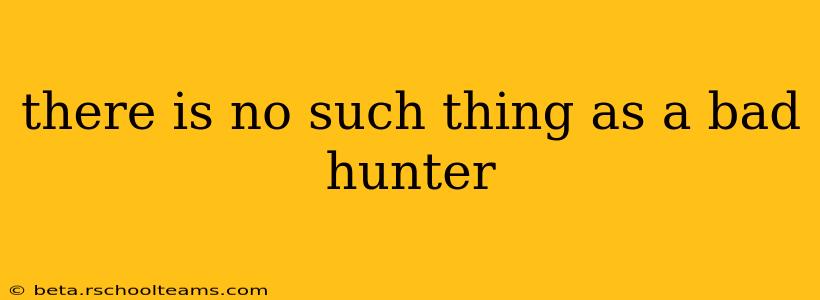There Is No Such Thing as a Bad Hunter: Reframing Skill and Success in the Pursuit
The statement "There is no such thing as a bad hunter" is provocative. It challenges the very notion of judging hunting success solely on the number of animals harvested. While it might seem overly simplistic at first glance, a deeper examination reveals a valuable truth about the hunting experience, encompassing skill, ethics, and the overall pursuit itself. This isn't about excusing poor performance; rather, it's about redefining what constitutes a "good" hunter and celebrating the multifaceted nature of the craft.
What Does it Mean to Be a Good Hunter?
Many associate a "good" hunter with a high kill rate. However, a more holistic perspective considers a broader range of factors. A truly skilled hunter possesses a deep understanding of their quarry, the environment, and themselves. This includes:
-
Respect for the Animal: Ethical hunting practices are paramount. This means understanding the animal's behavior, habitat, and role in the ecosystem. A good hunter strives for a clean, quick kill, minimizing suffering. The ethical considerations often outweigh the immediate desire for a trophy.
-
Understanding of the Environment: Successful hunting involves intimate knowledge of the terrain, weather patterns, and the animal's preferred habitats. This requires patience, observation, and often years of experience. A good hunter blends seamlessly into their surroundings.
-
Mastering Hunting Skills: This goes beyond simply aiming and shooting. It encompasses tracking, scouting, calling, and understanding various hunting techniques. It’s about constant learning and refinement of skills.
-
Safety and Responsibility: Safe gun handling, responsible firearm use, and awareness of potential hazards are critical. A good hunter prioritizes safety for themselves and others.
-
Appreciation of the Experience: Hunting isn't solely about the kill. It's about the connection with nature, the challenge of the pursuit, and the respect for the animal and the land. Even a fruitless hunt can be a valuable learning experience.
What About Hunters Who Don't Harvest an Animal? Are They "Bad" Hunters?
Absolutely not. Many factors influence a hunter's success on any given outing. Weather conditions, animal movements, and even simple luck play a significant role. A hunter who doesn't harvest an animal may still demonstrate exceptional skills in scouting, tracking, and understanding animal behavior. They may have learned valuable lessons about the environment, their own capabilities, or the challenges of the hunt. The experience itself is valuable.
How Can Hunters Improve Their Skills?
Continual learning and improvement are key. This can involve:
-
Seeking Mentorship: Learning from experienced hunters is invaluable.
-
Practicing Marksmanship: Consistent practice improves accuracy and confidence.
-
Studying Animal Behavior: Understanding animal habits significantly increases chances of success.
-
Improving Physical Fitness: Hunting can be physically demanding. Good physical condition improves stamina and endurance.
-
Respecting Wildlife Regulations: Adhering to regulations ensures ethical and sustainable hunting practices.
Is It Ethical to Hunt if You're Not Always Successful?
Ethical hunting transcends simple success rates. Ethical hunters prioritize the well-being of the animal, respect the environment, and adhere to all regulations. The pursuit itself, even without a harvest, can be ethically sound if it aligns with these principles.
In conclusion, "There is no such thing as a bad hunter" is a powerful statement advocating for a broader, more nuanced understanding of hunting. It's not about diminishing the importance of skill or success, but about emphasizing the respect, ethics, and learning inherent in the pursuit, regardless of the outcome. It's a call to celebrate the journey, the learning, and the connection with nature, even on days when the quarry remains elusive.
